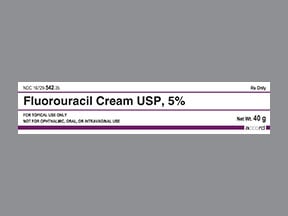
Efudex Coupons & Savings Card – Discount Prices from $36.01
Brand for: Fluorouracil
My prescription
Edit
40GM of 5%, Fluorouracil (1 Tube)
Select pharmacy

CVS
$36.01
COUPON PRICE
Walgreens
$39.08
COUPON PRICE
Albertsons
$39.61
COUPON PRICE
Walmart
$101.39
COUPON PRICEEfudex savings card
Show this card to your pharmacist
CVS
$36.01
BIN
ID
PCN
GRP
019876
LH3F6364B4
CHIPPO
LHX
Powered by
Related nucleoside metabolic inhibitors prescriptions
More prescriptions for skin cancer
Related nucleoside metabolic inhibitors prescriptions
More prescriptions for skin cancer
Price history for Efudex (brand) & Fluorouracil (generic)
1 Tube, 40GM of 5%
Average retail price for Efudex
Average retail price for Fluorouracil
Average SaveHealth price for Fluorouracil
Our price history data is based on aggregated prescription data collected from participating pharmacies in America. Our prescription data updates daily to reflect the latest price changes. If you notice a missing data point, it means there wasn't sufficient data available to generate a monetary value for that date.
Over the last 12 months, the average discount price of Efudex is $54.30 using the SaveHealth savings card. That's an average savings of 47.01% on Efudex with our discount card.
*Retail prices are based on pharmacy claims data, and may not be accurate when we don't have enough claims.
Efudex (Fluorouracil) dosage forms
Dosage Quantity Price from Per unit 40GM of 5% 1 Tube $36.01 $36.01 40GM of 5% 2 Tubes $53.72 $26.86 40GM of 5% 3 Tubes $79.44 $26.48
| Dosage | Quantity | Price from | Per unit |
|---|---|---|---|
| 40GM of 5% | 1 Tube | $36.01 | $36.01 |
| 40GM of 5% | 2 Tubes | $53.72 | $26.86 |
| 40GM of 5% | 3 Tubes | $79.44 | $26.48 |
What does Efudex do to your face?
Efudex, also known as fluorouracil, is a topical medication used to treat certain skin conditions, such as actinic keratosis and superficial basal cell carcinoma. When applied to the face, Efudex works by targeting and destroying abnormal skin cells. During treatment, patients may experience redness, irritation, peeling, and crusting of the skin as the medication takes effect. These reactions are part of the process as the damaged cells are eliminated. It is important for patients to follow their healthcare provider's instructions and to protect the treated area from sun exposure.
Is Efudex a form of chemotherapy?
Yes, Efudex (fluorouracil) is a topical form of chemotherapy. It is used to treat certain skin conditions, such as actinic keratosis and superficial basal cell carcinoma, by interfering with the growth of abnormal skin cells.
Do you rub in Efudix cream?
Yes, Efudix cream should be gently applied to the affected area, but it should not be vigorously rubbed in. It is important to apply a thin layer and allow it to absorb naturally. Always follow the specific instructions provided by a healthcare professional or the medication guide.
Does Efudex get rid of basal cell carcinoma?
Efudex (fluorouracil) is a topical chemotherapy treatment that can be used for superficial basal cell carcinoma. It works by targeting and destroying cancerous cells. However, it is typically used for superficial types and not for more invasive forms of basal cell carcinoma. A healthcare provider should evaluate the specific case to determine if Efudex is an appropriate treatment option.
What if there is no reaction to Efudix?
If there is no reaction to Efudix (fluorouracil), it may indicate that the medication is not effectively treating the condition. It is important for the individual to consult with their healthcare provider to assess the situation. The provider may need to evaluate the treatment plan, confirm the diagnosis, or consider alternative therapies.
